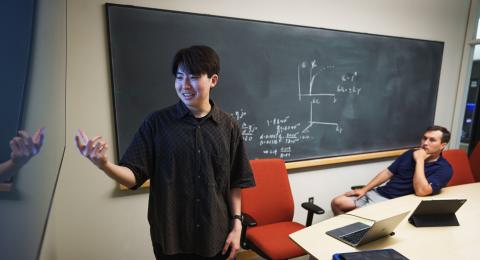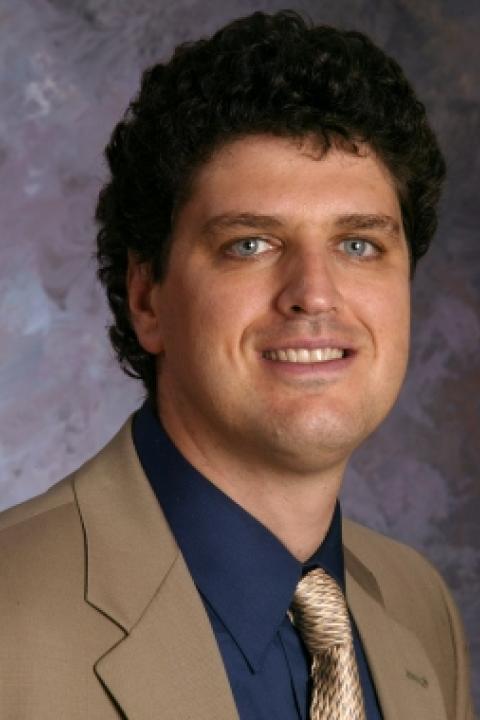The Physics (M.S.) master’s program at UNH allows you to deepen your understanding of core concepts like electromagnetic theory, quantum mechanics, and classical mechanics. Housed in a university recognized with the highest classification for research activity and the Space Science Center, you’ll dive into innovative research and advanced methodologies alongside award-winning faculty with expertise in condensed matter, nuclear and particle physics, high energy theory, space physics, astrophysics and cosmology, and physics education. These experiences, along with a capstone project, are designed to launch successful careers in academia, industry, government research, or further doctoral studies.
Why get a master’s degree in physics?
The M.S. degree gives you an understanding of physics’ basic theoretical structures as preparation for conducting cutting-edge research. You will learn to apply advanced research methodologies and facilitate deeper student thinking in the areas of electromagnetic theory, quantum mechanics, classical mechanics, and advanced mathematical methods. The graduate program in physics includes a capstone experience, which can be a master's thesis or project. Graduates of this master’s program are equipped for successful careers in research and development in business, industry, government and education/academia, and are prepared for doctoral programs.
Why choose UNH for your physics degree?
The Department of Physics offers excellent research opportunities for graduate students. UNH physicists are engaged in world-class research in applied optics, condensed matter, nuclear and particle physics, education, and high energy theory and cosmology. The Space Science Center fosters research and education in all the space sciences, ranging from the ionosphere to the Earth's magnetosphere, the local solar system, and out to the farthest reaches of the universe. In addition, UNH has just reached the top tier of research universities, Carnegie Classification R1, and our research portfolio brings in more than $110 million in competitive external funding each year.
Potential career areas
- Academia
- Education
- Government research
- Patent law
- Private industry research/development
- Renewable energy
- Science communication
Frequently Asked Questions
The graduate program looks for a Bachelor's degree with a strong undergraduate academic and research background, typically in physics, astrophysics, or space science, or similarly at the Master's level. For international students, English proficiency is required, although this can be satisfied in multiple ways (TOEFL or equivalent, interview, documentation of attending an English language school).
Faculty look for students who will be able to be happy, healthy, and productive in their chosen research area. The precise qualities otherwise vary by group, as some groups place emphasis on academic and mathematical performance, while others look for computational, hardware, or engineering skills. Applicants are encouraged to provide in their personal statement an area (or areas) of interest, as then the applicant's skill set can be evaluated against what faculty in those areas value most.
All our graduate students are typically fully funded on teaching assistantships or research assistantships for the academic year as long as they are making appropriate progress in the program. Summer funding is also typically awarded, but the amount varies by research group.
Late February to mid-March. Funding will be determined soon after the time of admission and the applicant will have full funding information well in advance of when they need to decide to accept or decline UNH's offer.
We do not generally accept late applications. We usually have two waves of decisions made in March.
Curriculum & Requirements
The Physics M.S. program prepares students for a career in industry, education, or government. The curriculum encompassing core areas of physics as well as elective classes that can be chosen to match their area of interest. The M.S. degree includes a capstone experience, which can be a Master's Thesis or a Master's project (for students in the PhD program, the oral thesis proposal satisfies the capstone requirement).
For more details, please consult the physics graduate student handbook.
Applying
Please visit the Graduate School website for detailed instructions about applying to the program.
Degree Requirements
To obtain the degree, students must complete a minimum of 30 credits as outlined below.
| Code | Title | Credits |
|---|---|---|
| Required Courses | ||
| PHYS 805 | Experimental Physics (or equivalent demonstrated experimental proficiency) | 4 |
| PHYS 931 | Mathematical Physics | 3 |
| PHYS 939 | Classical Mechanics | 3 |
| PHYS 941 | Electromagnetic Theory I | 3 |
| PHYS 943 | Quantum Mechanics I | 3 |
| PHYS 806 | Introduction to Physics Research and Teaching (two semesters) | 2 |
| Select one of the following options: | 12 | |
Option A-Thesis: 12 additional credits including a 6 credit Master's Thesis PHYS 899 with oral defense | ||
Option B-Project: 12 additional credits including a Master's Project PHYS 895 (up to 4 credits) with a seminar presentation | ||
Option C-Exam: 12 additional credits of coursework and passing the written comprehensive and oral qualifying exams (for students in the PhD program only) | ||
Accelerated Master's Overview
Accelerated Master’s programs offer qualified University of New Hampshire undergraduate students the opportunity to begin graduate coursework in select graduate programs while completing a bachelor’s degree. Accelerated master's programs are designed to provide students with an efficient and cost-effective pathway to earn both a bachelor's and master's degree or graduate certificate, enhancing career opportunities and long-term earning potential.
Accelerated Master's Highlights
- Begin studying advanced topics while an undergraduate student with the opportunity to complete a master’s degree or graduate certificate early.
- Master’s degree program students: Earn up to 12* graduate (800-level) course credits while completing a bachelor’s degree. This coursework will count as dual-credit toward both the bachelor’s and master’s degrees.
- Graduate certificate program students: Earn up to 8* graduate (800-level) course credits while completing a bachelor’s degree. This coursework will count as dual-credit toward both the bachelor’s degree and the graduate certificate.
- Students complete the bachelor’s degree, and then officially matriculate into the master’s or graduate certificate program to complete the remaining required graduate-level coursework.
*Some exceptions apply.
Accelerated Master's Admission Requirements
- A minimum 3.2 cumulative GPA is required.*
- A minimum of 90 undergraduate credits must be completed prior to enrolling in graduate (800-level) courses.
- Streamlined Graduate School Application (two letters of recommendation; most standardized tests and application fee are waived).*
*Some exceptions apply.
Accelerated Master's Requirements
- Students must attend a mandatory orientation session.
- Students must submit a special registration form each semester for dual-credit courses and note any DegreeWorks exceptions.
- Students may defer graduate matriculation for up to one year after earning their bachelor’s degree in most programs.
- See the Accelerated Master’s Catalog Policy and Accelerated Master’s Website for additional information and a list of programs. Note that some programs have additional requirements (e.g. higher-grade expectations) compared to the general policy.
Physics (M.S.) Accelerated Option
This graduate degree program is approved to be taken on an accelerated basis in articulation with the following undergraduate program(s):
| Code | Title | Credits |
|---|---|---|
| Physics (B.S.) | ||
| Students select from the following approved 800-level courses that can be completed in the undergraduate senior year for dual credit: | ||
| PHYS 805 | Experimental Physics | 4 |
| PHYS 810 | Astrophysics I | 4 |
| PHYS 812 | Introduction to Space Plasma Physics | 4 |
| PHYS 818 | Introduction to Solid-State Physics | 4 |
| PHYS 820 | Nuclear Physics | 4 |
| PHYS 864 | General Relativity and Cosmology | 4 |
Program Learning Outcomes
- Students will master the theoretical concepts in advanced mechanics, electromagnetism, quantum mechanics and statistical mechanics at the graduate level.
- Students will have an advanced understanding of the mathematical methods, both analytical and computational, required to solve complex physics problems at the graduate level.
- Students will be proficient in experimental physics.
- Students will have a specialized knowledge of their chosen field of research in physics at the level of a Masters degree.
- Students will be well prepared for further graduate study in physics and related disciplines.
- Students will be well prepared for advanced careers in a multitude of fields ranging from scientific and technical to financial.
- Students will be able to present advanced scientific ideas effectively in both written and oral form.
Deadlines
Applications must be completed by the following deadlines in order to be reviewed for admission:
- Fall: Jan. 15 (for funding); after that on rolling basis until April 15
- Spring: N/A
- Summer: N/A
- Special: Spring admission by approval only
Application fee: $65
Campus: Durham
New England Regional: No
Accelerated Masters: Yes (for more details see the accelerated masters information page)
New Hampshire Residents
Students claiming in-state residency must also submit a Proof of Residence Form. This form is not required to complete your application, but you will need to submit it after you are offered admission, or you will not be able to register for classes.
Transcripts
If you attended UNH or Granite State College (GSC) after September 1, 1991, and have indicated so on your online application, we will retrieve your transcript internally; this includes UNH-Durham, UNH-Manchester, UNH Non-Degree work and GSC.
If you did not attend UNH, or attended prior to September 1, 1991, then you must upload a copy (PDF) of your transcript in the application form. International transcripts must be translated into English.
If admitted, you must then request an official transcript be sent directly to our office from the Registrar's Office of each college/university attended. We accept transcripts both electronically and in hard copy:
- Electronic Transcripts: Please have your institution send the transcript directly to grad.school@unh.edu. Please note that we can only accept copies sent directly from the institution.
- Paper Transcripts: Please send hard copies of transcripts to: UNH Graduate School, Thompson Hall- 105 Main Street, Durham, NH 03824. You may request transcripts be sent to us directly from the institution or you may send them yourself as long as they remain sealed in the original university envelope.
Transcripts from all previous post-secondary institutions must be submitted and applicants must disclose any previous academic or disciplinary sanctions that resulted in their temporary or permanent separation from a previous post-secondary institution. If it is found that previous academic or disciplinary separations were not disclosed, applicants may face denial and admitted students may face dismissal from their academic program.
Letters of recommendation: 3 required
Recommendation letters submitted by relatives or friends, as well as letters older than one year, will not be accepted.
GRE Optional
The GRE scores are optional, if you wish to provide scores please email the scores directly to the department once you have submitted your application online.
Personal Statement/Essay Questions
Prepare a brief but careful statement regarding:
- Reasons you wish to do graduate work in this field, including your immediate and long-range objectives.
- Your specific research or professional interest and experiences in this field.
Important Notes
All applicants are encouraged to contact programs directly to discuss program-specific application questions.
International Applicants
Prospective international students are required to submit TOEFL, IELTS, or equivalent examination scores. English Language Exams may be waived if English is your first language. If you wish to request a waiver, then please visit our Test Scores webpage for more information.





















